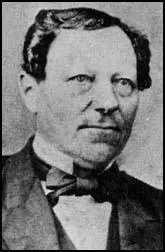Gustaf Unonius (original) (raw)

Gustaf Unonius was born of Swedish parents in Helsingfors, Finland, in 1810. To avoid Russian rule, the family moved to Sweden and Unonius was educated at Uppsala University. After graduating with a law degree he became a government clerk at Uppsala.
In 1841, Unonius and his new wife emigrated to the United States. The couple helped established the Swedish colony in New Uppsala, Wisconsin. Unonius entered the Episcopal ministry and served the community for seventeen years before returning to Sweden. His autobiography, A Pioneer in Northwest America: 1841-1858, was published in 1861.
Primary Sources
(1) Gustaf Unoius, A Pioneer in Northwest America: 1841-1858, (1861)
Often we had found notices nailed to some tree close to the public road announcing such meetings, and had had private invitations to attend them, especially from zealous partisans of the Democratic Party apparently eager to convert us to their political faith. Notwithstanding these solicitations, we had not as yet even applied for United States citizenship. This would not have prevented us, though, from taking pan in various communal affairs and from voting in the local elections. But we did not consider ourselves well-enough informed in these matters to be willing to take active part in them. Who were to become justices of the peace, road inspectors, constables, tax collectors, and so forth, did not much concern us. We were protected as to person and property and felt fully satisfied with our government, or, rather, we hardly noticed that we had any.
Foreigners are generally inclined to engage in political disputes long before they know what things are all about, and the rashness with which they make use of a citizenship they have gained all too soon is without question harmful to the country.
The American republic will no doubt sooner or later find it necessary to change its naturalization laws. The Germans and especially the Irish have hardly had time to get a roof over their heads before they begin to busy themselves with political affairs of all kinds, become eager partisans, get their hands into everything, and cause no end of trouble and disorder - all of which could be avoided if Americans were left to govern the country alone.
Accustomed perhaps to being of little or no importance before, in a more liberal social order they feel all-important, and the spirit of opposition that led them to political radicalism at home now induces them to oppose almost everything proposed by sane and wise Americans for the good of the country. Many a time I have heard Germans who hardly understood the simplest English sentences say, "We are not going to let the Americans rule over us." Their false conception of liberty and citizenship and that of the Irish gave me an absolute distaste for all politics, and neither then nor later did I meddle with it except in questions where my duty bade me appear quietly and calmly at the ballot box.
I love the democratic social order where the majesty of the people really is a majesty before which a man can stand with the same veneration, yes, with even more, than before a royal throne; and I believe that the American people, left to themselves, will one day reveal that majesty to the world.
(2) In his autobiography, A Pioneer in Northwest America: 1841-1858, Gustaf Unoius described visiting Chicago for the first time in 1845.
The principal site of the city is low and swampy, almost at the same level as Lake Michigan, and most of the buildings were at that time erected close to the lakeshore or on the miry, alluvial soil which time and again was flooded by the river flowing right through the city. Certain other parts consisted of waste expanses of sand without a blade of grass, and from them a floury dust was carried in blinding clouds over the clayey streets, sifting into the houses, making them as dusty inside as the outdoors was muddy and unpleasant. During the rainy season, and sometimes far into summer, the streets were almost impassable for driving as well as for walking. To be sure they were supplied with board sidewalks, but crossing from one side of the street to the the other entailed decided difficulties.
(3) Gustaf Unoius was shocked when he revisited Chicago in 1857.
Twelve years have passed, and what a change in its appearance as well as in its population, which is now 120,000. The formerly low, swampy streets have been raised several feet and paved with planks or stone. The river has been dredged and widened; its shores have been supported with piles, evened off, raised well above the water level, and are now occupied by loading piers or used as foundations for gigantic warehouses or factories. It is now a city in which private and public buildings have been erected that compare favorably both in size and style with the most splendid structures in the capitals of Europe. In a single summer, in 1855, 2,700 new houses were built, many of which would be a source of pride to any city.